| |||||||
| Search Forums |
| Advanced Search |
| Go to Page... |
 |
| Search this Thread |  339,347 views |
| | #1 |
| Senior - BHPian Join Date: Apr 2018 Location: Bangalore
Posts: 1,548
Thanked: 17,364 Times
| Renault Triber : Official Review The Renault Triber is on sale in India at a price of between Rs. 4.95 - 6.63 lakhs (ex-Delhi). What you'll like: • A 7-seat MPV at the price of B-segment hatchbacks. Lots of car for the money • We like the crossover'ish styling. Looks swell for an MPV! • Practical & spacious cabin, with a usable 3rd row. Ample storage too • Incredible 625L boot with 3rd-row removed. Many cargo & seating combinations available • Neutral road manners and city-friendly size (unlike most other 7-seater MPVs) • Equipment for a budget car (4 airbags, touchscreen ICE, reversing camera) • Loads of neat touches such as auto locking & unlocking, removable 3rd row seat, underseat drawer, fully adjustable 2nd row seats... What you won't: • Boring 1.0L petrol engine lacks pep & punch. It is the weakest link in this package • Average NVH levels. Engine can get noisy, while vibrations are felt on the inside • Some misses such as a thinner spare tyre, no foglamps / steering-mounted controls... • Cabin width makes it a 6-seater, not 7 (i.e. 2 adults on the middle row, not 3) • Minimal boot space with all seats occupied; you'll need that roof-mounted carrier • No diesel option in the line-up • Renault's after-sales service quality is inconsistent Last edited by GTO : 27th August 2020 at 08:39. |
| |  (50)
Thanks (50)
Thanks
 |
| The following 50 BHPians Thank ChiragM for this useful post: | AdityaDeane, AlQuazi, ambarish6, Avikbrio, BigTop, dailydriver, digitalnirvana, Floydrules, gauravanekar, gautam109, Geo_Ipe, GipsyDanger, Godzilla, GTO, InControl, jailbird_fynix, Kuldeep31, Leoshashi, mh09ad5578, mooza, N33raj, nalinsaxena23, Nazaar25, Omkar, phoenixash, Prakritij, Punatic, RavenAvi, rj22, samaspire, Samba, SatishBisht, Scorpion 10, shiva_shaan_5, shobhit.shri, Simat, Simhi, sriku, swiftnfurious, theexperthand, Thermodynamics, umeshd, V.Narayan, vaasu, Varun_HexaGuy, Vik0728, vredesbyrd, VTec_KickedInYo, wheelguy, yoscenario2000 |
| |
| | #2 |
| Senior - BHPian Join Date: Apr 2018 Location: Bangalore
Posts: 1,548
Thanked: 17,364 Times
| Review Index: Exterior Last edited by GTO : 24th January 2020 at 11:27. |
| |  (13)
Thanks (13)
Thanks
 |
| The following 13 BHPians Thank ChiragM for this useful post: | dailydriver, digitalnirvana, GTO, jailbird_fynix, mh09ad5578, phoenixash, RavenAvi, SatishBisht, sooshan, theexperthand, Varun_HexaGuy, wheelguy, yoscenario2000 |
| | #3 |
| Senior - BHPian Join Date: Apr 2018 Location: Bangalore
Posts: 1,548
Thanked: 17,364 Times
| Exterior  One must appreciate how the think tanks at Renault come out with "different" products. It started with the Duster, which was the first affordable monocoque crossover in India & the market rewarded it with ample success (initial years). Then came the SUV'ish-styled Kwid hatchback which has also enjoyed respectable volumes (Maruti copied the concept with the S-Presso). Now comes the Triber = a sub-4 meter 7-seater which has a surprisingly usable last seat row. Renault clearly understands that a differentiator is super important in crowded market segments. Renault India collaborated with Renault France to develop this modern, practical and VFM people carrier. With the help of cars like the Triber, Renault aims to double sales by 2022 to 2,00,000 units annually. The French carmaker also plans to launch a sub-4m compact sedan as well as a compact SUV based on the same platform. With a starting price of 4.95L and practicality as its USP, it hit the right notes with the Indian public - we are anyway a culture of big families! November sales were 6,071 units, while December numbers were 5,631. That's good for a Renault product and importantly, BHPians seem to appreciate the car too. The Triber came third in the 2019 Team-BHP Car of the Year poll (link to thread). Other sub-4 meter 7-seaters in India include the Datsun Go+, Maruti Eeco and TUV300. Each is very different though, thus we expect the Triber to be cross-shopped with hatchbacks instead of these 3. None of them are direct competitors.  The Triber is based on a modified version of the CMF-A platform which underpins the Kwid. The build quality is budget-class, yet quite satisfactory at this price point. As an example, if you press the door metal with your thumb, the flex is considerably lesser than a same-price Maruti. The panel gaps are even & consistent in most places, although on the wider side in areas (and inconsistent in a few). The car weighs 947 kg, which makes it 82 kg heavier than the similarly long Baleno (we have criticised the Baleno's feather-light build in its review). Powering the Triber is a 1.0-litre, 3-cylinder naturally-aspirated petrol engine. This is the weakest link of the package!! We are surprised that Renault didn't pick Nissan's 1.2L petrol, although the company is expected to introduce a turbo-charged 1.0 petrol shortly! An AMT automatic will be launched too. Coming to safety, Renault offers ABS + EBD, dual airbags, rear parking sensors, seatbelt reminder (for driver + front passenger) and a high speed alert system as standard on all variants. Additionally, it gets an impact-sensing door unlock on all variants, except the base RXE. The top-end RXZ additionally gets 2 side airbags and a rear view camera. We wouldn't hold our breath for its NCAP results (Indian Renaults have usually done poorly in them), although we would be very pleasantly surprised if the Triber does well. Smart looking face is dominated by a triple slat grille & projector headlamps. There's also LED DRLs and plastic cladding + silver skid plate for a crossover look. As if this much chrome / silver wasn't enough, a "chrome pack" is part of the accessory list. The raised stance gives the Triber good road presence & we love this mango colour:  Vertical rear end is far simpler. I found it boring, but GTO liked it, especially the tail-lamps & TRIBER badging. The plastic bumper and faux skid plate again add to that crossover look. Other than the badging, there's no use of chrome anywhere:  The wheels are moved to the extreme ends to maximise legroom! You could say this car has no bumpers  . At 2,636 mm, it has one of the longest wheelbases among sub-4m cars, only short of the TUV300. Believe it or not, the wheelbase is longer than the Creta's. Notice the stepped roof which increases headroom for rear passengers: . At 2,636 mm, it has one of the longest wheelbases among sub-4m cars, only short of the TUV300. Believe it or not, the wheelbase is longer than the Creta's. Notice the stepped roof which increases headroom for rear passengers: We appreciate how it's styling is more "crossover" than boring 7-seater MPV. At 1,643 mm, the Triber's height is comparable to other sub-4m SUVs. However, at 1,739 mm, it has among the shortest widths:  The Triber gets subtle creases to add a little muscle to the design. Also check out the C-pillar kink. Don't be misled by that "cladding" on the doors = it is just black stickering:  Sweet headlamp clusters have black & chrome inserts. Projector headlamps are offered as standard on all variants:  A look at the fine detailing. Quite interesting to see budget cars get such features:  With all the lights in action:  Three-slat grille gets chrome inserts and a large Renault logo. Looks pretty good:  The dual-tone bumper gets a fake skid plate and an air dam with a honeycomb grille:  DRLs instead of foglamps (no foglamps even as an accessory). The DRL housing has a chrome surround:  DRLs are bright and prominent, even during the day:  No underbody protection at all. The ground clearance is rated at 182 mm (unladen):  Four creases on the bonnet lend it a muscular look:  Wipers aren't concealed under the bonnet and neither is the washer. The single black washer on the body coloured bonnet is an eyesore: 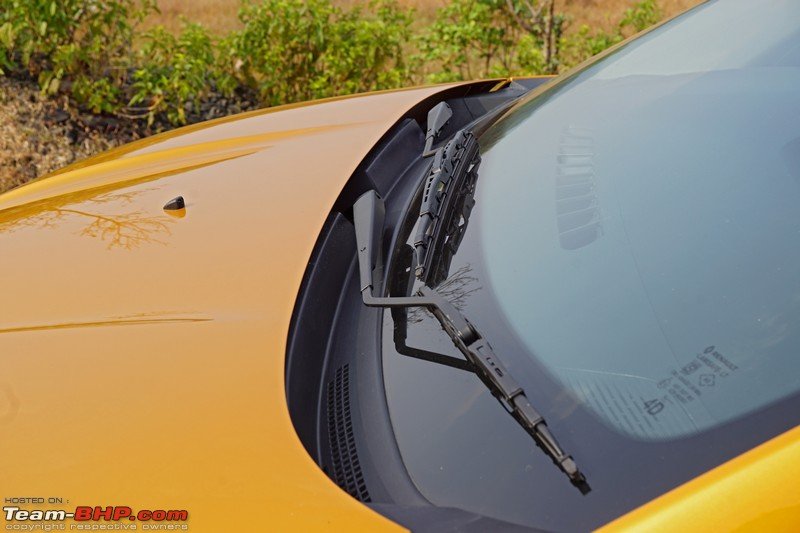 The washer squirts out three jets to all sides of the windshield. The wipers cover the windshield area well:  Panel gaps are mostly even...  ...but not tight in some areas:  Gaps around the bonnet aren't uniform:  Simple dual-tone ORVMs with no integrated turn indicators. Electrically adjustable, but not electrically-foldable:  No request sensor on the door handles. Just like the Captur, the Triber comes with "walk away lock" which - as the name suggests - locks the vehicle as you walk away from it after the drive. You know what's cooler? Walk up to the car with the key in your pocket and it automatically unlocks! There is no need to touch the key at all. However, if you press the boot unlock button on the key card from a little farther away, the doors don't automatically unlock when you are near the car. The feature is annoying sometimes as the car keeps locking and unlocking itself if you are standing near it or walking around it (say, if you're hanging out with your friends): 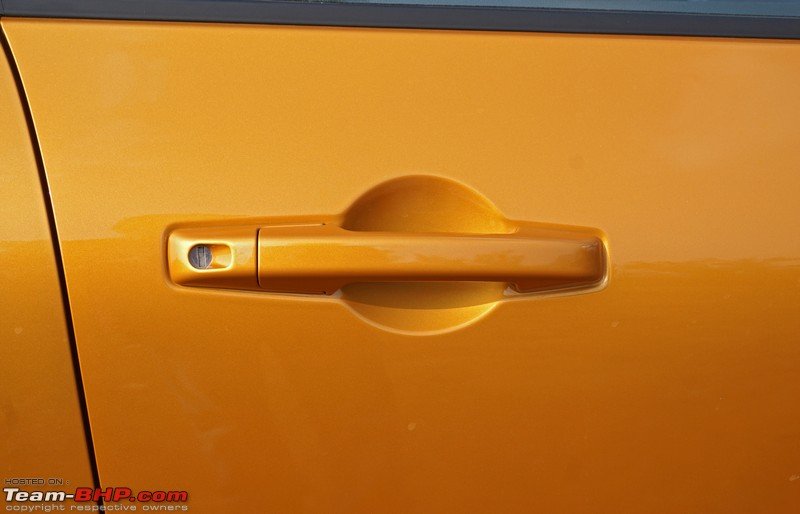 The stepped roof liberates more headroom on the inside. The bump up is smartly covered by the roof rails (only given on top 2 variants):  The C-pillar gets a kink with the variant badging. Also notice how the roof height increases in this pic:  Nicely done. The crease of the D-pillar aligns just right with the rear spoiler:  Subtle lines, creases & mild muscle add character to the side:  The Triber rides on 15-inch wheels shod with 185/65 Ceat SecuraDrive rubber. Lower variants get 14-inch rims shod with 165/80 rubber. Originally, even the top-end came with 14" rims. We appreciate Renault quickly responding to feedback & releasing the RXZ with 15" wheels + thicker tyres:  Bet you thought they were alloys in the previous image? Look closely and you will notice these are actually wheel caps on steel wheels. Smart design:  Plastic wheel arches on the fenders for that "crossover" look. Turn signals integrated here. Even the Kwid gets its indicators on the wheel arch (link):  No plastic cladding on the doors. Just like in the Kwid, this is merely a sticker (link):  The rear wheel arch gets a splash guard as well:  Ribbed roof for better structural rigidity. We're told that the functional roof rails can take up to a 50 kg load. A luggage carrier is available as an official accessory. Buy it if you're going to use the 3rd row for road-trips as there is just 84 liters of luggage space with the last seat up:  Roof rails are made out of plastic at the ends, and metal in between. Notice the difference in texture. Roof rails are available only on the RXT and RXZ variants:  Long antenna. A short stubby piece would have looked more contemporary:  Tailgate gets a neatly integrated spoiler:  On the other hand, the HMSL is poorly integrated on the spoiler. Look at the pic above and see how it juts out...like an after-market accessory! Black windshield washer is placed in an ugly manner next to the HMSL, instead of being hidden on the HMSL unit:  Split wraparound tail-lights. Renault calls these 'Eagle Beak' tail lamps:  With all the lights in action. Only the cluster on the left gets a reversing lamp on the tail-gate unit:  With the lack of a proper rear bumper (car is stretched to the ends of whatever the 4 meter regulations will allow), some BHPians are worried that the tail gate would get damaged even in a minor rear collision. Gets smart looking T-R-I-B-E-R lettering in the centre. We appreciate that a chrome strip has NOT been slapped on:  Only the RXZ variant gets rear wash / wipe and the defogger:  Reversing camera is tucked away here, with the electromagnetic boot release next to it:  One of the few cars to get a badge with the company's name on it (recent Hyundais, Marutis, Hondas, etc have just their logo):  Also gets 'Energy' badging (we can tell you that the 1.0L is anything but energized though):  The rear bumper gets 3 parking sensors and a faux silver skid plate for styling:  There's a honeycomb mesh pattern between the bumper and skid plate:  Spare tyre is placed under the car (one of the reasons behind its massive boot). Unfortunately, the spare is a 14-inch wheel shod with 165/80 rubber. Because its differently sized, you will have to maintain lower speeds when using it. That sucks! We hope Renault releases a full-size spare on the RXZ ASAP:  Spare is red-coloured (to remind you to change) & has an 80 km/h sticker:  Easter egg on the rear windshield (Triber and a tent)!  With a sub-4m crossover. Even though the Triber is 4 mm shorter than the Nexon, it sure looks longer in the picture:  Two 7-seaters. One >4m, the other <4m. While Honda's styling is all weird & edgy, Renault's is clean & classy:  Last edited by Aditya : 25th January 2020 at 11:40. |
| |  (38)
Thanks (38)
Thanks
 |
| The following 38 BHPians Thank ChiragM for this useful post: | AdityaDeane, AkMar, akshay81, ambarish6, Avikbrio, darklord, digitalnirvana, GTO, InControl, jailbird_fynix, JS Kwt, mh09ad5578, N33raj, Osteon206, phoenixash, Punatic, RaghuVis, RavenAvi, sainyamk95, samaspire, SatishBisht, Shanksta, Simat, sparky@home, sunny29584, sups, swiftnfurious, Tgo, theexperthand, Thermodynamics, twin-turbo, V.Narayan, vaasu, Varun_HexaGuy, vikred, wheelguy, yoscenario2000, _lewie_ |
| | #4 |
| Senior - BHPian Join Date: Apr 2018 Location: Bangalore
Posts: 1,548
Thanked: 17,364 Times
| Interior - Front  Walk up to the Triber with the key in your pocket and it unlocks automatically  . The front doors open / shut in a two-stage action (don't remember the last car we reviewed which had dual-stage front doors!). They open wide enough, the floor is at a comfortable height, while the roof is on the higher side. Thus, it's very easy to step in and out. Once inside, there is sufficient legroom & headroom at the front, but cabin width is limited. . The front doors open / shut in a two-stage action (don't remember the last car we reviewed which had dual-stage front doors!). They open wide enough, the floor is at a comfortable height, while the roof is on the higher side. Thus, it's very easy to step in and out. Once inside, there is sufficient legroom & headroom at the front, but cabin width is limited.The front windshield is large and the rear one is adequate. This, along with the large windows, ensures that there is enough light entering the cabin. The use of beige on the dashboard, doorpads, seats, pillars and roof further helps matters. The dashboard features a dual-tone of black and beige, with a silver trim in between. Overall interior quality is acceptable for this price point. There's lots of scratchy plastics & if you look closely, you'll find that some of them feel tacky / cheap. But again, at this price, no one will really complain. Practicality is the USP of this Renault. The company says that the cabin length is 2,933 mm. Look at the short bonnet area and you'll see how Renault has matched Honda's 'man maximum, machine minimum' mantra with this car. The Triber can be used as a 7-seater (actually 6), or the last row seats can be removed to turn the car to a 5-seater with a massive boot. The last row seats can be removed individually as well. To add to this, the Triber has lots of storage space in the cabin. Renault claims that the total interior storage space is 31L. In comparison, the more expensive Ertiga has an interior storage rating of 22L (as stated by Renault). Straight-forward & functional dashboard design:  Visibility is fantastic. The seating position is higher than in hatchbacks: 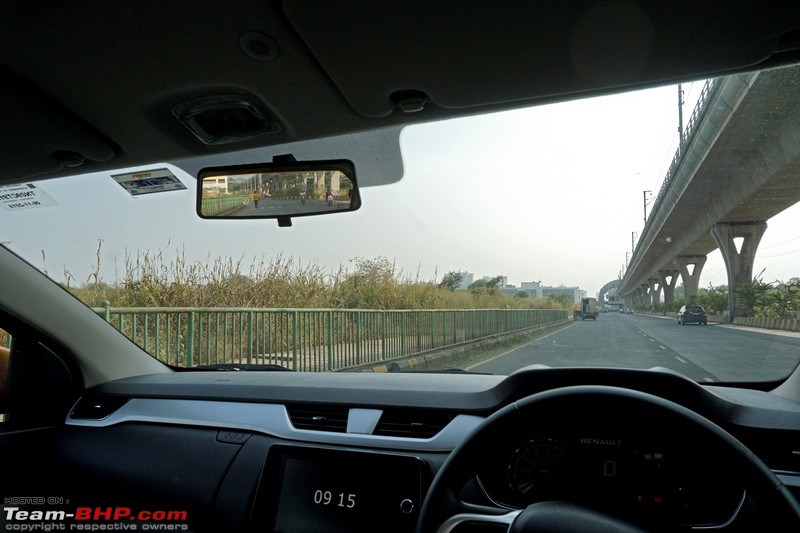 Smart-looking steering wheel is the right size and has sufficient thickness. it has thumb contours too. Steering mounted controls have been given a miss, but provisions for them have been left on the wheel. The blank portion looks ugly. What makes things worse is that the touchscreen ICE has no buttons for stuff like track change, which means you'll have to take your eye off the road for that:  The start / stop button is placed on the centre console and gets a chrome surround:  Steering can be adjusted for height only, not reach (usually the case in this class of car):  Gimmicky digital instrument cluster comes with a temperature gauge, MID and digital tachometer. The tachometer has increments of 500, making it impossible to get an accurate reading (enthusiasts won't prefer this). As the revvs climb, the numbers illuminate and the final notch turns red. Although we don't prefer this digital cluster, we can understand the importance of a "differentiator" for Renault. It is a talking point in the showroom: 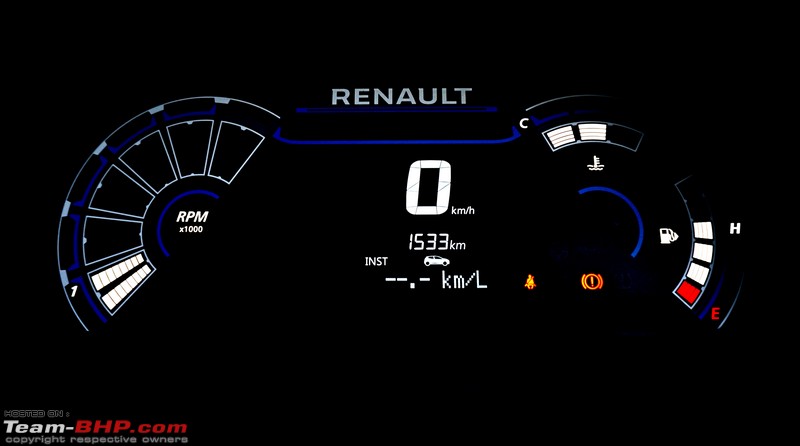 The MID consists of a digital speedometer, and also displays the instantaneous / average fuel efficiency, 2 trip meters, amount of fuel used and range:  A glance at some of the warnings (including door open). Look at the dot-matrix style fonts of the lowest row...reminds us of Casio calculators from the 90s!  The instrument cluster gets this chrome trim on either side. You can also check out how the display looks during the day (tacky IMHO): 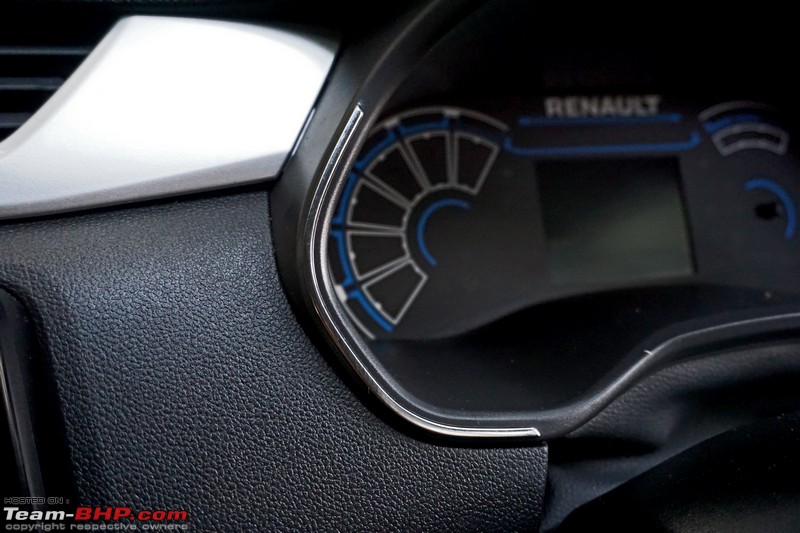 Simple stalks. Although the finish is basic, the stalks do feel like they are built to last:  A/C vents get some chrome love too. Mass market will appreciate this:  The headlight leveling knob is placed low down, to the right of the driver. Its not easy to reach. Cable-operated leveler feels terribly outdated:  Outdated pull-type round knob to open the bonnet is placed even lower and into the dashboard: 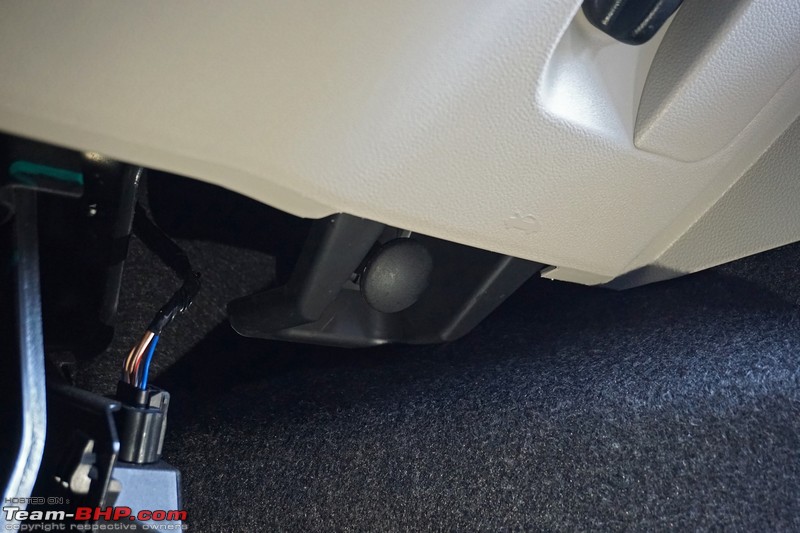 Like the dashboard, the doorpads get a black + beige colour theme with a fabric armrest. The beige portion is there lower down too - it's sure to get soiled with time. The doorpads are properly finished with no sharp edges anywhere:  Outdated pull / push type door locks. Reminds us of the Alto!  Only the RXZ variant gets silver door handles, while others get it in black. Note the exposed screw:  The armrest gets soft fabric - a welcome feature. Its dark colour is also practical for a high-touch area:  Power window console gets a piano black finish. Driver's window gets one-touch up & down on the RXZ variant. The window lock switch disables only the rear windows - front passenger can still roll his glass down:  Door pockets are deep. They can hold 2 water bottles:  Seats are finished in dual-tone fabric upholstery, with the high-contact area smartly in a darker colour (lesser maintenance required). They get fixed headrests. Thin seats aren't overly cushy, yet do the job; back support is good for a car of this segment. The seats aren't very wide and larger drivers might find the side bolstering to be restrictive. Because of the side airbags, owners shouldn't install seat covers:  Sturdy + ugly lever to recline the seat. IMHO, Renault should have provided a height-adjustable seat (Swift offers it): 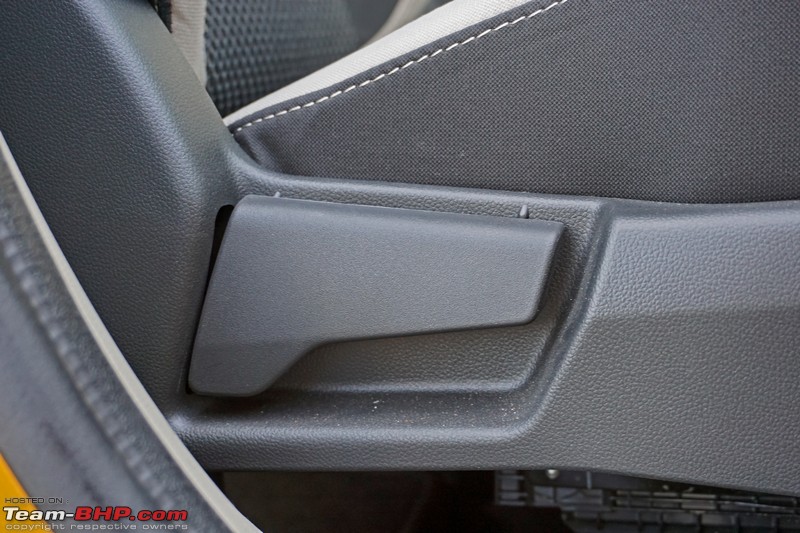 Fore & aft travel range is good enough to allow even drivers with a laidback driving position to be okay. I was comfortable driving it at 5'4", and so was GTO at 5'10":  Zooming in to show you the seat upholstery pattern: 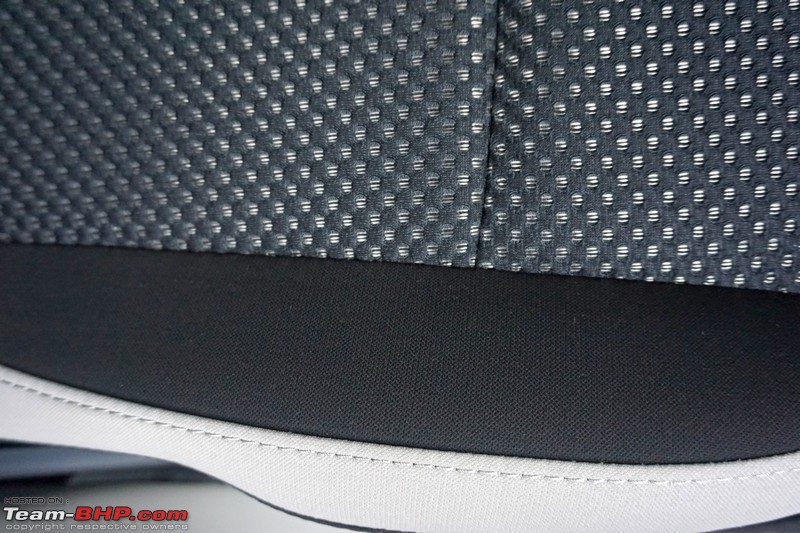 No height-adjustable seatbelts. Weirdly, only the driver's seatbelt gets a pre-tensioner and load limiter. Your poor spouse is all we can say!  Storage bin under the front seat can take up to 1 kg of odd items. It has a locking mechanism. Lift it to pull it out, and push it in + lift it to lock it in place:  Small footwell with no dead pedal. You are going to have to rest your foot under the clutch pedal on long journeys. Additionally, the accelerator is too close to the brake pedal. There will be some rare times when you intend to press only the brake pedal, but youll press the brake + accelerator at the same time (happened to GTO)!!! This is a design failure for those with a large shoe size. Somehow, the French never get their ergonomics correct. The way the carpet is cut & fitted here makes it seem like an after-market accessory shop has done it, not the factory: 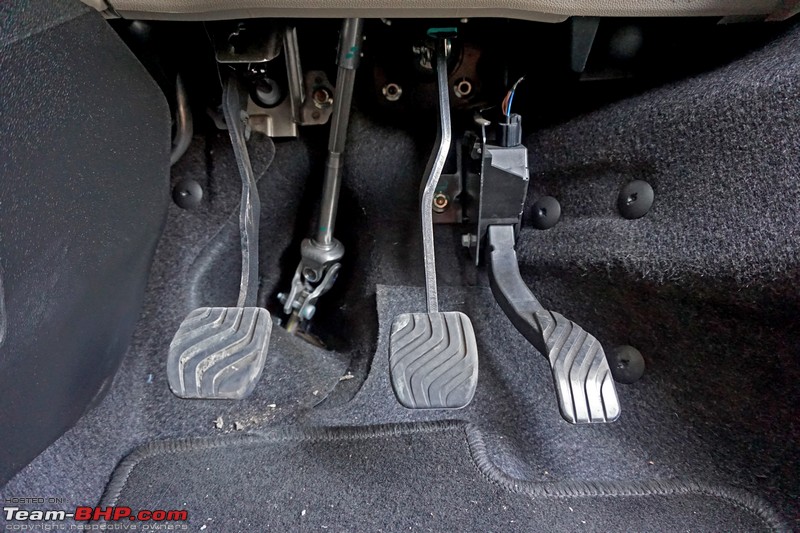 ORVMs are sufficiently wide, but could have been taller towards the outer ends:  IRVM is wide enough to cover the entire rear windshield. Thick D-pillars restrict visibility though (it's the case with most cars that have a 3rd-row):  Day / Night manually-adjustable IRVMs are available only on the RXT and RXZ variants:  Rearward visibility is good as the windshield is tall & the quarter glasses are well-sized. However, the thick D-pillars restrict visibility. In this pic, notice how the roof goes up to increase last-row headroom:  Silver strip runs across the dashboard (housing the air vents), while Renault has placed piano black finishing around the ICE: 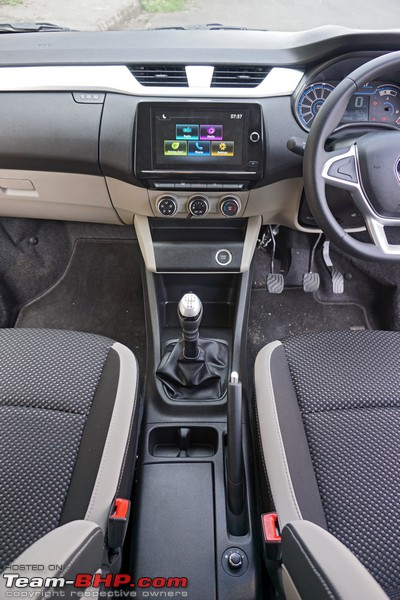 A closer look at the silver panel. Air vents get a chrome trim on the adjustment knob. 8" touchscreen head-unit is covered in a separate post:  Touchscreen ICE neatly protrudes out of the center fascia:  Sweet aircraft-style switches for the rear defogger, hazard lights and central locking feel great to use and look cool. There is one blank on either side: 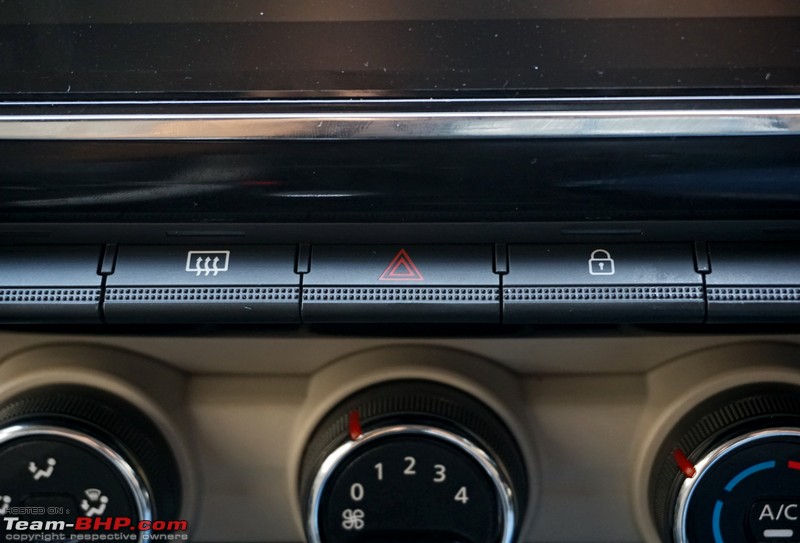 The rear defogger gets a yellow indicator, while the central locking gets a red indicator:  Circular knobs with a knurled finish + chrome ring for the air-con:  A rotary slider knob is provided for the fresh air / recirculation modes:  Storage compartment in the centre facia is useful to park your smartphone. There is a protrusion in the front to ensure that the phone doesn't slide out: 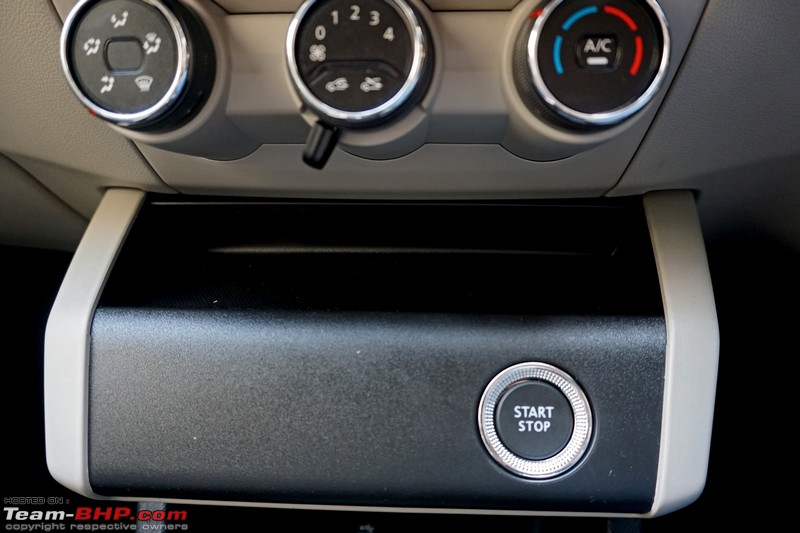 Another storage compartment (reasonably deep) in the centre facia. This also houses the Aux and USB ports. Ribbed floor to conceal scratches: 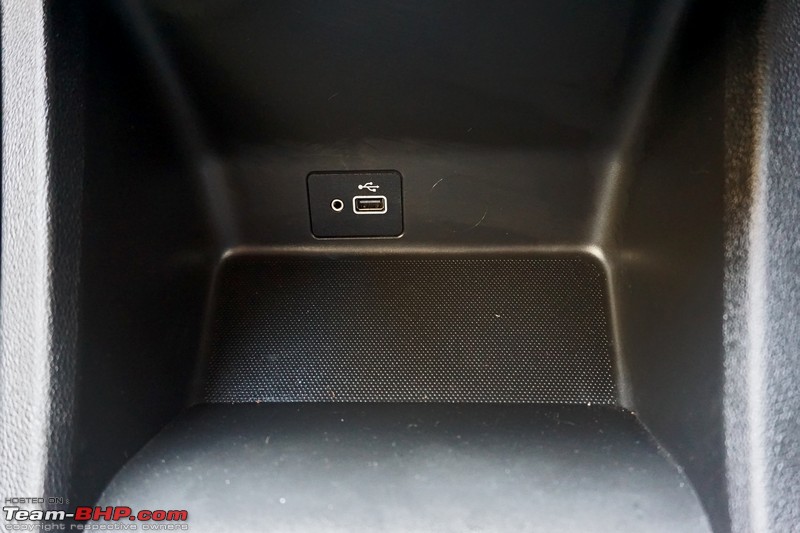 The centre console has two cupholders:  Bird's eye view of the center console:  Deep 4.3L storage space in the centre console adds to the practicality:  This storage area is cooled too:  Press this button to open the upper glovebox which has a capacity of 4.4L. Those aren't 3 separate buttons - it's just a design touch on the main button:  The upper glovebox is wide but shallow, hence suitable for coke cans, documents & miscellaneous items only:  The lower 7.0L glovebox is more accommodating. There's also a separate provision for your sunglasses, wallet & visiting cards. Open the cover on the rear-left...  ...to reveal the fuse box:  The lower glovebox also comes with a cooling function:  The OBD port is located below the dashboard, on the passenger side (most manufacturers provide it on the driver's side):  The A/C blower unit is placed below the front passenger seat:  Exposed screw on the floor (below the passenger seat) looks ugly. Observe closely and you'll spot a couple of other exposed screws & bolts in the cabin (example in the glovebox):  Terribly basic & border-less roof bezel houses the front cabin lights. Feels very cheap & flimsy. Leave the door open for sometime and the lights go off automatically to save battery juice:  Bluetooth mic is located next to it:  Both sunvisors get a vanity mirror, but they are not illuminated: 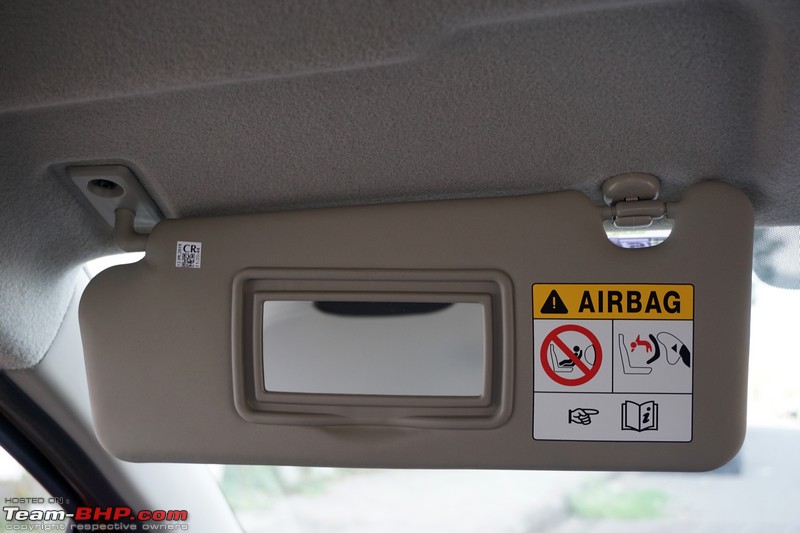 The driver's sunvisor gets a flap as well to hold toll / parking slips. We're happy to see a mirror on this side (many far more expensive cars usually don't have one):  Driver + passenger airbags are standard on all variants:  RXZ variant gets side airbags too  (no seat covers here please): (no seat covers here please): Last edited by GTO : 24th January 2020 at 11:04. |
| |  (28)
Thanks (28)
Thanks
 |
| The following 28 BHPians Thank ChiragM for this useful post: | AdityaDeane, AkMar, akshay81, Avikbrio, dailydriver, darklord, digitalnirvana, GTO, InControl, jailbird_fynix, N33raj, Ponbaarathi, Punatic, RaghuVis, RavenAvi, samaspire, SatishBisht, sunny29584, swiftnfurious, Tgo, theexperthand, Thermodynamics, V.Narayan, Varun_HexaGuy, VTec_KickedInYo, wheelguy, yoscenario2000, _lewie_ |
| | #5 |
| Senior - BHPian Join Date: Apr 2018 Location: Bangalore
Posts: 1,548
Thanked: 17,364 Times
| Interior - 2nd Row Like the front, the rear doors of the Triber also open / close in a two-stage action. They swing out sufficiently wide (71 degrees), the roof of the car is pretty high and the floor isn't too far off the ground. This makes ingress & egress convenient for most people (including the elderly). The rear seat is placed at a comfortable height as well - compare its height to the front seat in this pic:  A look at the rear doorpad which gets a fabric armrest as well. We like the speaker cover design:  The rear power window console & its piano black panel. Visibly exposed screw looks ugly:  Like the front doors, the door pockets of the rear doors are deep and can hold 2 bottles: 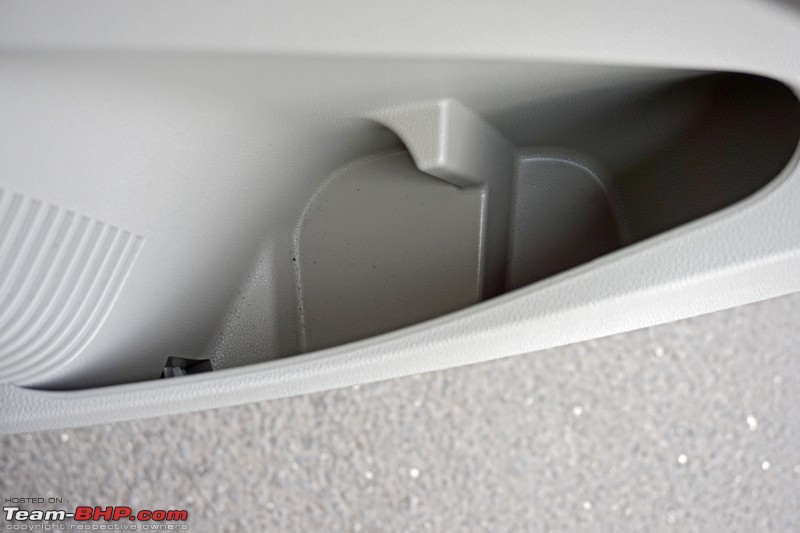 Enough space for 2 adults (including legroom), but not 3 healthy ones. Thin seats are flat and the headrests are on the firmer side:  Legroom is healthy & tall passengers won't have any issues. Do note that this seat has fore & aft adjustment:  Aditya is 5'10" and he was an easy fit behind:  Rear bench gets 2 adjustable headrests (a pleasant surprise as the driver doesn't). The centre passenger will have to make do with a lap belt & an extremely flat seat:  Seats have sturdy metal adjustment levers (for fore & aft movement):  The sliding second row gets a good travel range. The difference between the two seats in extreme positions is shown here:  Aditya can sit behind a tall front passenger without issue. Thigh support is mediocre. People sitting here can slide their feet under the seat, but not too far inside because their feet will touch the A/C unit that is placed under. At 5'10, he has around 4 inches of spare headroom:  The seatbacks are soft and both get useful pockets to keep the loose stuff in:  The area where your foot / shin area would meet the front seat is soft:  Both seats can be reclined or folded forward individually. You can set it up to a totally relaxed angle if you so wish. Here is an image showing the max angle:  Selective folding if you need to carry a combination of cargo + passengers. Because the 3rd row seats are individually foldable & removable too, you have a crazy number of combinations:  When not in use, the seatbelt buckles can be tucked away into these cutouts: 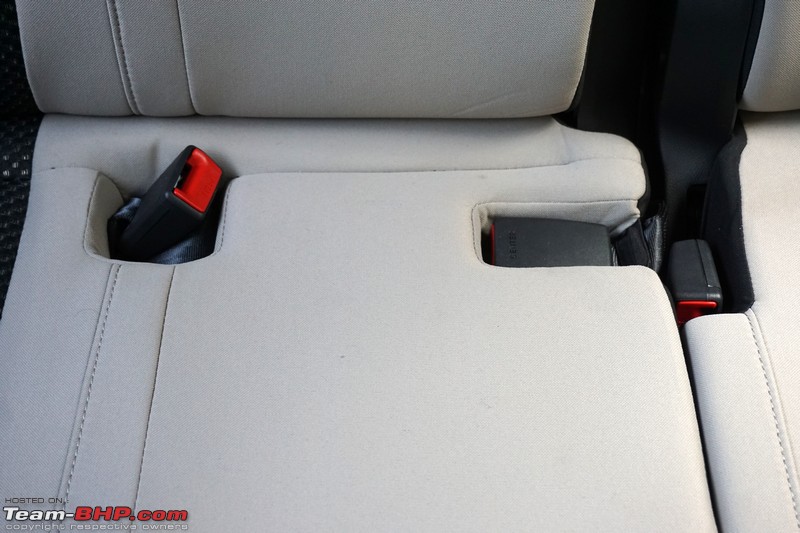 The buckle for the center passenger is marked such. No confusion:  Smart! One lever with two holding positions. The lower handle can be used by 2nd row occupants to adjust their backrest angle. The upper one will be used by 3rd row occupants to flip the seat forward (when they want to get out):  Like the front, a terribly basic & border-less roof bezel houses the rear cabin lights. Feels very cheap & flimsy:  Air-con vents are mounted on the B-pillar. To shut these vents, move the air flow direction controllers downwards. These air vents are audible at level 2 & loud at level 3:  Rear passengers get fixed grab handles sans coat / bag hooks:  This is the maximum that the rear window rolls down to. A bit restrictive on a nice weather day:  Rear passengers get a 12V charging port for their smartphones:  Control for the rear aircon vents is strangely placed on the centre console (behind the handbrake). French ergonomics, I tell you!!  Short floor hump is not a bother at all:  Labels showing how to fold the right part of the second-row...  ...and tumble the left part:  Here is some more French quirkiness for you. The jack is stored under the RHS second-row seat. Space is limited too & you have to put your hand under the seat adjustment lever, then unscrew this knob to remove it. The removal is a process in itself but if you thought that's cumbersome, try putting it back (in short = a royal pain). It's as if someone intentionally engineered to make things as tough as possible. Why complicate simple things, Renault?  Last edited by GTO : 24th January 2020 at 11:03. |
| |  (30)
Thanks (30)
Thanks
 |
| The following 30 BHPians Thank ChiragM for this useful post: | AdityaDeane, Avikbrio, AYP, dailydriver, digitalnirvana, GTO, InControl, InterceptorGuy, jailbird_fynix, mh09ad5578, N33raj, Ponbaarathi, Prakritij, Punatic, raghu13uk, RaghuVis, RavenAvi, samaspire, SJD@NewDelhi, sparky@home, swiftnfurious, Tgo, theexperthand, Thermodynamics, V.Narayan, vaasu, Varun_HexaGuy, wheelguy, yoscenario2000, _lewie_ |
| | #6 |
| Senior - BHPian Join Date: Apr 2018 Location: Bangalore
Posts: 1,548
Thanked: 17,364 Times
| Interior - 3rd Row Using the lever, you can flip the left middle-row seat forward in a single, continuous motion. The flip & tumble operation is so intuitive to use that even a layman can pull it off, without asking for instructions. Do note that only the left seat can be tumbled forward, which we agree with as it's the non-traffic side on Indian roads. We found 3rd-row ingress to be relatively easy: 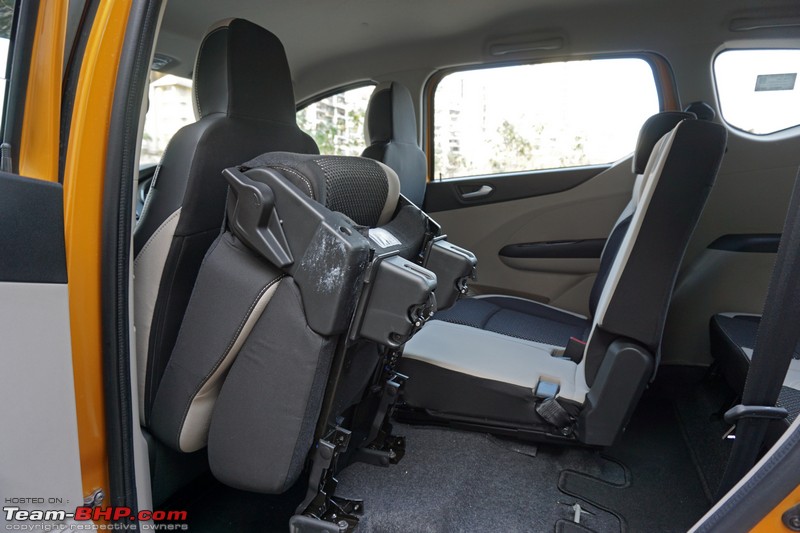 A 3rd row which can actually be used by adults! Adults should be totally okay here in the city and on shorter highway drives; on long trips though, it's better to keep the kids here. Seat is thin. Adjustable headrests are provided, but they are too close to the rear windshield. Considering the fact that the rear bumper is almost non-existent, it is a bit unnerving to sit in the third row:  Like most other 3rd-row seats, the seat is placed low and an adult will sit in a knees-up position (no thigh support). See how close Aditya's head is to the tail-gate & windscreen: 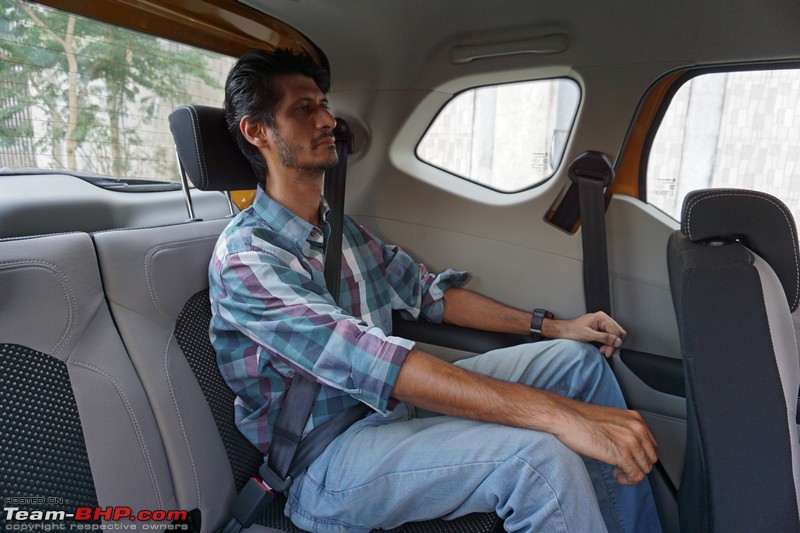 The area where your leg would meet the seat ahead is soft. Your feet can slide in a little:  Those on the last row get roof-mounted A/C vents. Do note that the rear air-con can cool the cabin, but not heat it (heater only on the dash-mounted vents). Rear a/c has a separate evaporator:  Third row gets sufficient light coming in. One does not feel claustrophobic, thanks to the glass area and light-coloured interior. Don't miss the fixed grab handle above the window:  Armrests get a black finish on top and it looks good. Unlike the 1st & 2nd row passengers though, no fabric on this armrest. The left unit gets a slot to hold small items and a 12V port: 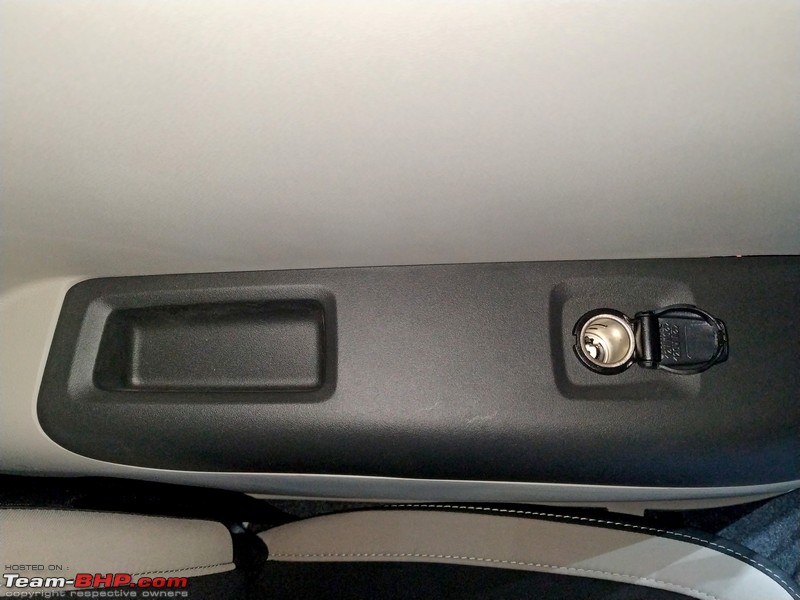 A look at the armrest for the right passenger:  Third row gets simple non-retractable seatbelts:  Provision to hang up the seatbelt when it's not in use: 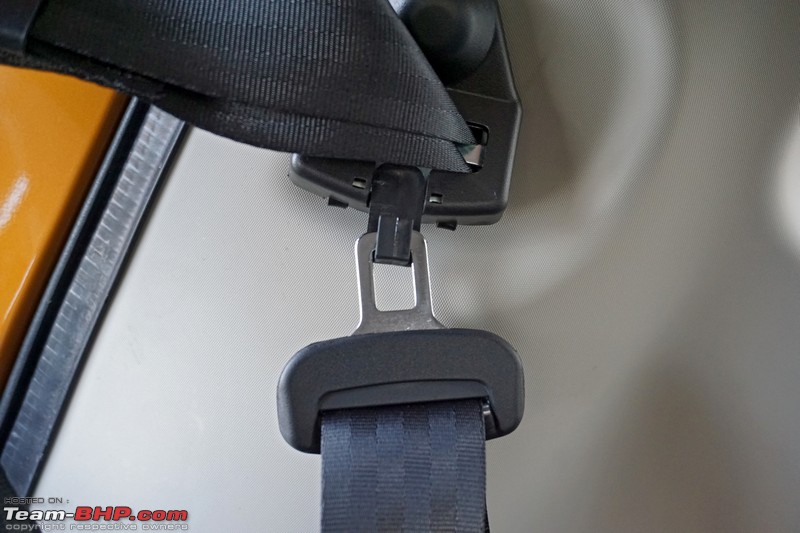 A clip too, for holding the seatbelt in place. These will come in handy when you are folding down or removing the last-row's seats:  Roof liner feels durable:  With the third row seats in place, there is 84 liters of luggage space available. Enough only for some small bags. The roof-top luggage carrier (available as an official accessory) will be a popular one:  Loading bay is low enough. The seats can be folded individually for more cargo... 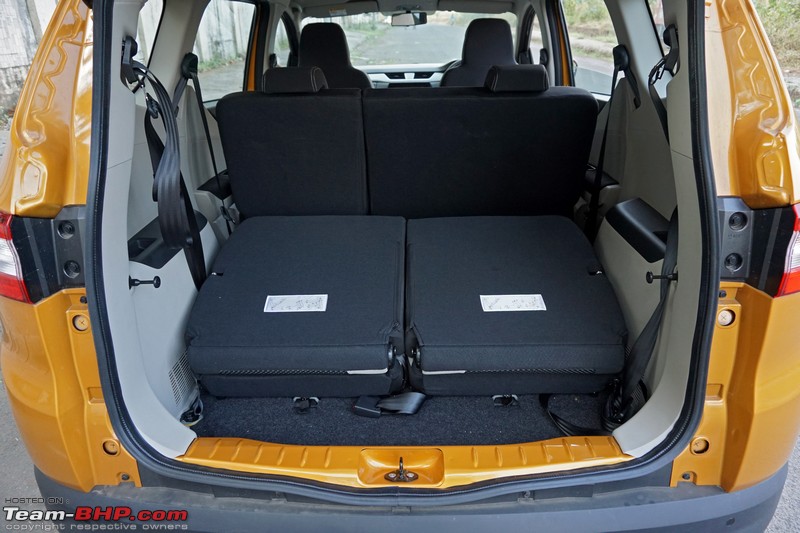 ...or removed entirely. Don't sweat, it is easy to remove the last row seats, but requires a little effort to put them back. With the third row removed, boot space increases to an insane 625 litres (that's more than the Octavia notchback). A full trunk mat is available as an official accessory if you wish to cover up the brackets & seatbelts on the floor (for a cleaner look):  You could remove just 1 seat for added flexibility. Here, the Triber has a boot space of 320 litres:  A label with instructions on how to remove the seats has been provided: 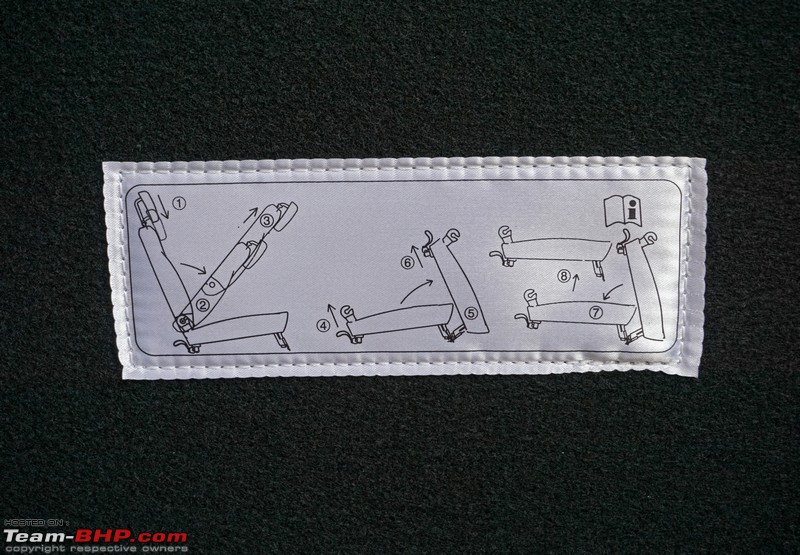 Pull this knob up to unlock and fold the third row seatback. We feel it's rather big & ugly looking:  Pull this strap to remove the seatbase:  Slot on the floor to insert the front of the seatbase. It can be a bit tricky and may take a few attempts when you are trying to put the seats back:  Protrusion to lock the seatback in place sticks out:  The seats can be packed into two separate bags. Renault has really gone all out here! A label with instructions has been provided on the seats:  Here's the seat stored in its bag. Has handles to pick it up. Nice design & branding:  Remember that the spare wheel is located under the car (image link). The screw to release the spare is at the base of the boot, making it a major task to swap tyres if your boot is full:  No separate bag to store the tools. They are parked in the warning triangle's bag. Remember that the jack is inconveniently placed under the 2nd row seat:  Tailgate gets a partial cover on the inside:  Exposed defogger circuit on the rear windscreen looks ugly. Should have gotten a plastic cover:  Last edited by GTO : 24th January 2020 at 11:03. |
| |  (28)
Thanks (28)
Thanks
 |
| The following 28 BHPians Thank ChiragM for this useful post: | AdityaDeane, Avikbrio, AYP, dailydriver, darklord, digitalnirvana, GTO, InControl, jailbird_fynix, mh09ad5578, N33raj, Ponbaarathi, Prakritij, raghu13uk, RaghuVis, RavenAvi, samaspire, SatishBisht, sunny29584, swiftnfurious, Tgo, theexperthand, Thermodynamics, V.Narayan, vaasu, wheelguy, yoscenario2000, _lewie_ |
| | #7 |
| Senior - BHPian Join Date: Apr 2018 Location: Bangalore
Posts: 1,548
Thanked: 17,364 Times
| In-Car Entertainment The Triber is equipped with the MediaNav Evolution infotainment unit with an 8" touchscreen. The system supports Android Auto / Apple CarPlay and comes with 4 speakers + 2 tweeters. You get USB, Bluetooth, Aux-in connectivity and USB Video Playback. The system gets voice commands as well. The ICE features an Eco rating display, which shows you how economically you have been driving and also advises you on how to improve your efficiency. The touchscreen has no lag and its clarity is good. Visibility is satisfactory even under direct sunlight. We hate the fact that there are just 2 physical buttons though. Renault should have provided physical buttons for the most used functions, especially considering the fact there are no steering mounted controls. Only a volume control knob & voice activation button are provided. The system welcomes you with the company name & logo on start-up:  We like the speaker cover design! In the higher variants, music is played via 6 speakers, including one on each of the 4 doors...  ...and two tweeters on top of the dashboard:  A look at the button to activate voice commands:  The main menu's layout is simple with multi-coloured tabs. These tabs are big and easy to read. Press on the moon icon on the top left...  ...and the screen goes blank (in case it distracts you from driving). The system will still display the time and media information:  The system supports video playback via USB:  You get the usual sound adjustments. Sound quality is alright for an OEM, but not comparable to the Tiago's Harman system:  The display settings let you choose between dark...  ...and light modes:  "Driving Eco" gives you a score based on how efficient your driving style is, and also individual star ratings for acceleration, gear shifting and anticipation (braking):  The trip report gives the total distance, time taken, average fuel consumption, average speed and uniquely, the distance traveled without fuel consumption (we're guessing this is coasting):  Eco coaching recommends the engine oil to be used (well-placed plug for their own engine oil with high profit margins):  Advice on how to drive to improve your efficiency:  It also tells you when you are doing it perfectly!  Advice is doled out (or you could simply read our excellent article):  The Triber comes with Android Auto connectivity...  ...and Apple CarPlay:  The homescreen gets a shortcut for Android Auto:  The top-end variant gets a reversing camera with static guidelines. The camera's daytime quality is decent:  These guidelines can be switched off, and the brightness, colour, and contrast can be adjusted:  Camera visibility in dark areas isn't great, however. The single reversing light & camera quality could be a contributor:  Last edited by GTO : 24th January 2020 at 11:02. |
| |  (21)
Thanks (21)
Thanks
 |
| The following 21 BHPians Thank ChiragM for this useful post: | AdityaDeane, Avikbrio, AYP, darklord, digitalnirvana, gauravanekar, GTO, InControl, jailbird_fynix, mh09ad5578, N33raj, Ponbaarathi, raghu13uk, RavenAvi, samaspire, theexperthand, Thermodynamics, vaasu, Varun_HexaGuy, wheelguy, yoscenario2000 |
| | #8 |
| Senior - BHPian Join Date: Apr 2018 Location: Bangalore
Posts: 1,548
Thanked: 17,364 Times
| Driving the 1.0L Petrol MT  To power the Triber, Renault has used a tweaked version of the 1.0L, 3-cylinder petrol engine that we've seen in the Kwid. Among other improvements, it gets dual VVT (variable valve timing) and produces 71 BHP (@ 6,250 rpm) and 96 Nm (@ 3,500 rpm). These figures are slightly more than what you get in the Kwid 1.0L. Summary = The engine is "adequate" and does the job. That's all. There is no doubt it is the weakest link of an otherwise innovative package. If you aren't in a hurry, we'd recommend waiting for the turbo-charged 1.0L petrol that's expected later this year. Still, why Renault didn't pick Nissan's 1.2L petrol engine is beyond us! That is indisputably superior to this 1.0 motor. Even though the Triber is a 7-seater, the car weighs just 947 kg. This gives the vehicle a power-to-weight ratio of 75 BHP / ton and torque-to-weight ratio of 101 Nm / ton. Upon cranking the engine, there is some cabin shake felt - typical of 3-cylinder units. At idle, you do feel vibrations in the cabin. These vibrations increase with engine revvs, as does engine noise. We are unhappy with the NVH package. The Triber moves off from a standstill without any effort. The shorter gearing helps driveability in the city, and the car can pull from even ~1,000 rpm. It managed to clear the 2nd-gear speed breaker test with no problem. 3rd gear is also a useful tool for the city; we could even climb up a flyover from 20 km/h in 3rd. You won't need to shift down too often in the city. It is only when a gap to the vehicle in front needs to be closed quickly that one needs to drop a gear or two. The Triber doesn't fly off the line from the word go, but the engine starts coming into its stride above ~1,500 rpm & enters the powerband above ~2,000 rpm. On the open road, the 1.0L engine is strictly average. It can get you from city A to city B and that's about it. We recommend driving in the middle lane of the expressway, as the power delivery lacks any kind of punch. The car accelerates alright until 90 km/h, but performance is sluggish @ 100 and beyond. Overtaking needs to be carefully planned too. This is all the more the case if all 3 seat rows are filled with occupants. With 5+2 adults onboard, you are really going to have to work this engine h-a-r-d. Starting on an incline will involve clutch slipping & careful handbrake usage if all 3 seat rows are filled. Again, stick to the middle lane, cruise in 5th gear and enjoy the scenery instead. At high rpms, the engine doesn't have much to give and it really isn't rev-happy. In terms of cruiseability, we cannot tell you the exact rev levels because the rpm gauge lights up in increments of 500 rpm only. Regardless, what we can tell you is that the engine is busy at 100 km/h. There is simply no comparison to Maruti's 1.0L engine in BS6 tune that we recently experienced in the S-Presso. Maruti's 1.0 is more refined, revv-happier and sounds better as well. The 5-speed gearshift is alright to use. Ergonomically, it falls right into your hand. The MT is a bit notchy to use, and isn't as smooth as the Japanese or Korean variety in the market. The clutch is light and its travel range isn't too long either. Do note that things can get jerky & the Triber leaps ahead if you are careless with the clutch. For a smooth ride, you will have to release it slowly. Coming to NVH levels, there is that typical 3-cylinder thrum present. Above ~3,000 rpm, engine noise is evident and post ~4,500 rpm, it starts to sound strained & rough. Engine vibrations are definitely more than I would like. You feel them at idle, and as you drive. While road noise is par for the course, wind noise makes its presence felt at 90 km/h and gets louder as the speedometer needle climbs. In the area of fuel economy, the Triber carries an ARAI rating of 20 km/l. Bonnet has some weight to it and gets an insulation sheet:  Point A to point B engine that doesn't impress in any particular way. Proper "cool air" intake. See how the piping brings in fresh air right from the front of the car:  This opening in the front grille directs air to the intake:  There is no underbody protection:  Adequate insulation is present on the firewall:  Ergonomically well-placed gear lever is easy to reach. Reverse is up & above 1st:  Gear lever gets a leather boot. Before engaging reverse, you need to lift the collar up:  Gearshift indicator shows when to upshift as well as downshift. Newbies will appreciate this feature:  Last edited by GTO : 24th January 2020 at 11:02. |
| |  (22)
Thanks (22)
Thanks
 |
| The following 22 BHPians Thank ChiragM for this useful post: | AdityaDeane, anshuman1117, Avikbrio, digitalnirvana, gauravanekar, GTO, InControl, jailbird_fynix, mh09ad5578, N33raj, Ponbaarathi, Prakritij, RaghuVis, RavenAvi, Tgo, theexperthand, Thermodynamics, V.Narayan, vaasu, VTec_KickedInYo, wheelguy, _lewie_ |
| | #9 |
| Senior - BHPian Join Date: Apr 2018 Location: Bangalore
Posts: 1,548
Thanked: 17,364 Times
| Ride & Handling The low speed ride quality is compliant & typical of cars from this price segment. However, it does have a bit of a firm edge to it which you'll feel on bad roads. Small bumps are absorbed well, but don't expect that magic-carpet ride quality of other Renaults like the Duster. Must be noted that our test vehicle was running on 15" wheels, while lesser variants get 14" rims with taller rubber. The ride quality on those will be cushier. Expressway comfort is satisfactory and no owner will complain. We must add that the suspension appeared to feel less bouncy with passengers on the rear seat (versus being empty). Out on the highway, straight line stability is par for the course at 100 km/h. The grip provided by the 185 mm Ceat SecuraDrive tyres is regular OEM stuff. As is the case with monocoque UVs, the Triber is car-like to drive and reasonably well-behaved through the corners. There is some body roll, but it is not excessive at all. Drive it like a family MPV and you will be alright. The electric power steering is light at parking speeds and in the city. Owners will appreciate this. The EPS weighs up adequately at highway speeds as well. The unladen ground clearance is rated at 182 mm and we didn't scrape the undercarriage anywhere. Will wait for Team-BHP ownership reports for the verdict on how it handles huge speed-breakers with a full passenger load. All variants of the Triber get ABS + EBD. The brakes work as expected. The Triber comes with the ubiquitous McPherson Strut setup at the front and a Torsion Beam Axle at the rear:  Last edited by GTO : 24th January 2020 at 10:58. |
| |  (23)
Thanks (23)
Thanks
 |
| The following 23 BHPians Thank ChiragM for this useful post: | AdityaDeane, Avikbrio, digitalnirvana, gauravanekar, Godzilla, GTO, haisaikat, jailbird_fynix, mh09ad5578, Mynameis, N33raj, Ponbaarathi, Prakritij, RavenAvi, swiftnfurious, Tgo, theexperthand, Thermodynamics, V.Narayan, vaasu, Varun_HexaGuy, wheelguy, _lewie_ |
| | #10 |
| Senior - BHPian Join Date: Apr 2018 Location: Bangalore
Posts: 1,548
Thanked: 17,364 Times
| Other Points Comes in 4 variants - RXE, RXL, RXT and RXZ. During the unveiling, Renault showcased an AMT transmission as well, but it was not launched with the car. We feel Renault missed an opportunity here & hope to see the AT soon. Renault delivered the 10,000th Triber within just 2 months from launch. Quite a success for Renault! That's also more than what sister concern Nissan India sells in the entire year! In December 2019, the company started exporting the Triber to South Africa. Exports to other parts of Africa & SAARC countries are expected to commence soon. Base RXE does not come with central locking. It gets a boot release button on the centre console. Renault claims that the car gets speed-sensing door locks. However, our test car didn't lock automatically when we started driving. Other BHPians have reported the same issue. The Triber comes in 5 colours - Metal Mustard (our test car & our favourite), Electric Blue, Fiery Red, Moonlight Silver and Ice Cool White. This car is a solid alternative to hatchbacks for those desiring humongous boot space, and need a removable third row for added practicality. That boot is "Skoda Octavia big"! The space & boot make it a solid Uber / Ola candidate too. Kwid owners have reported a fair share of niggles. We hope the Triber's track record comes up cleaner. The second row reclines to a maximum angle of 42.2 degrees. Worried about legroom / headroom in the rear? Don't be. Renault Indonesia put a 6'5" basketball player in all three rows of the Triber. Thanks to BHPian ashutoshb for sharing it in this post. A diesel engine hasn't been offered to keep the engine bay as compact as possible. Man maximum, machine minimum... The Triber comes with a 2 year / 50,000 km warranty as standard. Renault offers a 5 year / 1,00,000 km extended warranty. Highly recommended (Related Read). First service is at 2,000 km / 2 months & second visit at 10,000 km / 12 months. Subsequent services at every 10,000 km / 12 months. The Renault Triber brochure can be viewed here - Renault Triber.pdf. Disclaimer: Renault invited Team-BHP for the Triber test-drive. They covered all the travel expenses for this driving event. Last edited by GTO : 24th January 2020 at 10:54. |
| |  (23)
Thanks (23)
Thanks
 |
| The following 23 BHPians Thank ChiragM for this useful post: | AdityaDeane, AYP, dailydriver, digitalnirvana, fanteen, gauravanekar, GTO, InControl, jailbird_fynix, mh09ad5578, N33raj, Ponbaarathi, Prakritij, Punatic, RavenAvi, Tgo, theexperthand, Thermodynamics, uday.ere, V.Narayan, Varun_HexaGuy, wheelguy, yoscenario2000 |
| | #11 |
| Senior - BHPian Join Date: Apr 2018 Location: Bangalore
Posts: 1,548
Thanked: 17,364 Times
| The Smaller yet Significant Things The digital tachometer shows readings in increments of 500; the numbers light up as the revvs climb. Glows red @ 5,500 rpm:  Unique key card for the Triber. Along with the usual lock / unlock buttons, it gets a boot unlock button and one to turn the interior lamps on. The skeleton key is placed inside and rattles when you shake the key. Opinions are divided in the Team-BHP office. I found it smart, but GTO thinks the key is ugly:  The steel wheels & caps are designed to look like alloys. The cover fits exactly over the wheel design. Quite convincing, I must say:  Sad single-tone budget horn. Owners should upgrade. Love it or hate it, but this small device is as important to safety in India as airbags & ABS are:  BHPian ak916 took the Triber camping. Read about it in this post:  Renault showcases some of the seating + cargo options:  Good cladding in the front wheel well...  ...but just some coating in the rear:  Fuel tank capacity is 40 liters:  The stock headlamps are just about adequate:  Recommended pressure of 35 PSI is on the higher side. Different tyre pressures aren't mentioned for varying loads, or the differently sized wheels. Surprising:  Yep, the ORVMs are India-friendly:  The window did not roll down completely on the driver's door (left image), yet it did on the front passenger's side (right image):  Accessories offered with the car include body graphics, wind deflector and most importantly, a roof carrier: 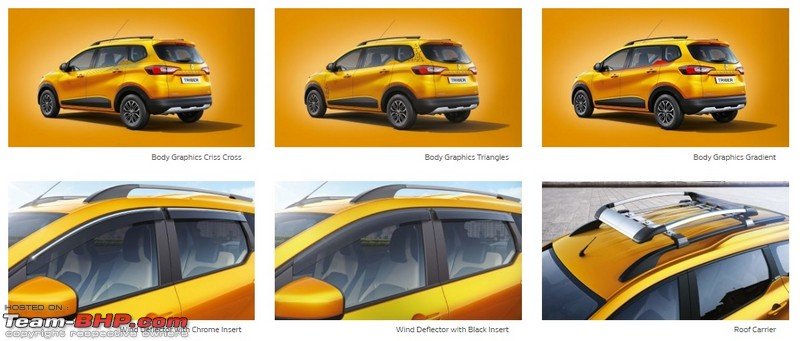 Chrome parts are offered for more bling on the exterior...  ...as well as the interior. We'd take the one for the roof lamp as it looks border-less in stock form:  These accessories add illuminated parts as well as other lights like ambient lighting and puddle lamps:  A boot floor cover and IRVM back cover (matching colour!) are offered:  Last edited by GTO : 24th January 2020 at 10:53. |
| |  (41)
Thanks (41)
Thanks
 |
| The following 41 BHPians Thank ChiragM for this useful post: | AdityaDeane, anumod, AYP, AZT, BigTop, dailydriver, darklord, Desmosedici, digitalnirvana, Doge, fanteen, Fordlover88, gauravanekar, GTO, InControl, jailbird_fynix, luvDriving, mh09ad5578, mpthy, N33raj, nmenon, Osteon206, Ponbaarathi, Prakritij, raghu13uk, RaghuVis, RavenAvi, rphukan, SoumenD, Swap_Abarth, Tgo, theexperthand, Thermodynamics, thiagar, Time_Machine, uday.ere, V.Narayan, vaasu, VijayAnand1, wheelguy, yoscenario2000 |
| |
| | #12 |
| Team-BHP Support  | Re: Renault Triber : Official Review Thread moved from the Assembly Line to Official Reviews. Thanks for sharing! Rating thread 5-stars  . . I thoroughly enjoyed this one because it’s a lot of fun to review interesting cars. And the Triber does offer something unique & different to a country full of large + extended family outings. In the “Art of War”, Sun Tzu says if the enemy is in superior strength, evade him. Renault is doing just that with Maruti / Hyundai; I’m more impressed that they’re able to be consistent with this strategy. The Duster was the first car-like monocoque SUV, the Kwid got that “micro SUV” thing going and now, here is a sub-4 meter car with an astonishing amount of cabin & boot space. Heck, that 3rd row seat is actually usable  Sad 1.0 engine though. I’m flabbergasted that Renault didn’t pick Nissan’s superior 1.2L petrol from the Micra. Even the Datsun Go+ uses that Micra engine (76 BHP in the AT). I hear that the Triber is getting an AMT. If that’s the case, the Go+ will have the superior transmission too. Give me a smooth CVT over a jerky AMT any day. You still have lots of time to make amends, Renault. Give us a better engine from your family for this family car. Last edited by GTO : 24th January 2020 at 11:33. |
| |  (38)
Thanks (38)
Thanks
 |
| The following 38 BHPians Thank GTO for this useful post: | AdityaDeane, AkMar, AZT, ChiragM, digitalnirvana, gauravanekar, Highh5, InControl, jailbird_fynix, mh09ad5578, mpthy, N33raj, naveenroy, Osteon206, Ponbaarathi, Punatic, RaghuVis, RavenAvi, RedViper, sainyamk95, Simhi, sooshan, SoumenD, sri_tesla, theexperthand, Thermodynamics, THE_DRIFTER, Turbojc, uday.ere, vaasu, vaish9925, Varun_HexaGuy, VivOverland, VTec_KickedInYo, wheelguy, xjosephjacob, yoscenario2000, _lewie_ |
| | #13 |
| BANNED Join Date: Jul 2019 Location: Earth
Posts: 1,745
Thanked: 8,878 Times
| Re: Renault Triber : Official Review Awaiting for Triber official review since long. Rated it 5-star without even reading it completely  . Triber is an interesting package from Renault, voted it in the Team-BHP car of the year thread too. . Triber is an interesting package from Renault, voted it in the Team-BHP car of the year thread too. Now I will read the review  . .Last edited by wheelguy : 24th January 2020 at 11:47. |
| |  (4)
Thanks (4)
Thanks
 |
| The following 4 BHPians Thank wheelguy for this useful post: | AdityaDeane, AZT, GTO, NTO |
| | #14 | |
| Senior - BHPian Join Date: Feb 2013 Location: India
Posts: 1,756
Thanked: 6,318 Times
| Re: Renault Triber : Official Review Excellent review as always. Rated 5*. Quote:
 Hope Renault is able to sustain the numbers with this now. Kudos to their team for coming up with a really innovative product. Its indeed a lot of car for the money  Last edited by SoumenD : 24th January 2020 at 11:54. | |
| |  (4)
Thanks (4)
Thanks
 |
| The following 4 BHPians Thank SoumenD for this useful post: | AdityaDeane, gauravanekar, GTO, RedViper |
| | #15 |
| BHPian Join Date: Dec 2010 Location: Mumbai
Posts: 110
Thanked: 151 Times
| Re: Renault Triber : Official Review I was pretty dismissive of the Triber initially, but have changed my views with time. Its one of those way out of the box ideas that really work. Though with some trade-offs to get to the low price. Renault should do an "XL-6" on the Triber. Launch a premium version with:
If Renault can launch something like that at up to Rs. 8.5 - 9.5 lacs ex-showroom (that's a nearly Rs. 2 - 3 lac upgrade budget to play with vs current top-end), I'm sure it'd find buyers. I'd certainly be in the market for a more refined Triber, with its insane flexibility and ability to fit into city traffic & tight parking spots. Secondly, per the Renault India website, it seems extended warranty isn't offered on the Triber. Two years is way too short! One question: Regarding the slot on the floor for inserting the seatbase - does the exposed metal look prone to rusting? Last edited by gautam109 : 24th January 2020 at 12:34. |
| |  (12)
Thanks (12)
Thanks
 |
| The following 12 BHPians Thank gautam109 for this useful post: | 2himanshu, AZT, digitalnirvana, fhdowntheline, gauravanekar, GTO, Osteon206, RedViper, SatishBisht, sharktale, vaish9925, _lewie_ |
 |



